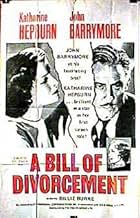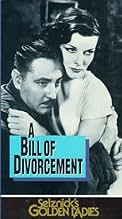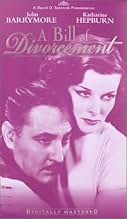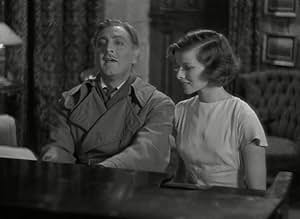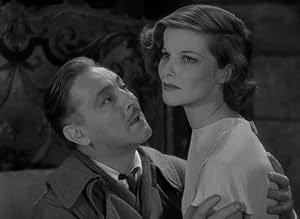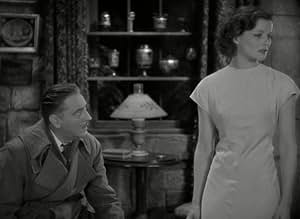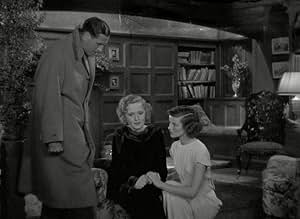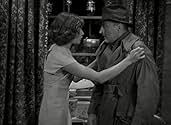AVALIAÇÃO DA IMDb
6,5/10
2 mil
SUA AVALIAÇÃO
Adicionar um enredo no seu idiomaA man, Hilary Fairfield returns home after fifteen years in a mental asylum. However, he finds things are not the way they were when he left.A man, Hilary Fairfield returns home after fifteen years in a mental asylum. However, he finds things are not the way they were when he left.A man, Hilary Fairfield returns home after fifteen years in a mental asylum. However, he finds things are not the way they were when he left.
- Direção
- Roteiristas
- Artistas
- Prêmios
- 5 vitórias no total
Bramwell Fletcher
- Gareth
- (não creditado)
Dick French
- Party Guest
- (não creditado)
Julie Haydon
- Party Guest
- (não creditado)
Dennis O'Keefe
- Party Guest
- (não creditado)
Mildred Shay
- Party Guest
- (não creditado)
- Direção
- Roteiristas
- Elenco e equipe completos
- Produção, bilheteria e muito mais no IMDbPro
Avaliações em destaque
Unlike some other reviewers here, I did not find the acting stagy or over-the-top melodramatic. Then again, most of the movies I watch are from the 20s and 30s, so I am used to this style of acting.
I was surprised by this movie. It breaks your heart, then never lets up. There's no light comedy to offset the drama, and there's no happy ending.
John Barrymore was amazing. My favorite performances of his have for a long time been Dr Jekyll (1920) and Svengali (1931). I've seen many other films of his (including Counsellor at Law which many people claim to be one of his best performances), but after seeing Bill of Divorcement tonight, I think this might be my most favorite performance. Sure, it was hammy, but that doesn't make it bad. Barrymore emoted his heart out, and my heart did literally ache each time he expressed his own agony and pain on screen. I was shocked to find myself in tears over his character's pain.
Billie Burke was a wonderment as well. I know her best from her slightly comic roles, such as the supercilious wife in Dinner at Eight, or her various Mrs. Topper roles (and, yes, of course Glinda the Good Witch). I didn't know she had it in her to do dramatic stuff, but she had me in tears as well on more than one occasion. She really made me feel the agony and conflict she was in, being in love with Paul Cavanagh and yet feeling pity and obligation to Barrymore.
I found the writing and the direction to be superb. One particular scene was almost sublime in its pathos: Billie Burke sitting in a chair, John Barrymore on the floor with his arms wrapped around her, his head in her lap as he cries. He can't comprehend why she doesn't want him, he asks her didn't she vow to be with him through better and worse, through sickness and in health? He asked what he did that was wrong, other than to get sick? He reminds her of what a kind person she is, how he even noticed her once stepping around a "green crawling thing" so as to not harm the creature, and he wonders if she could show pity and compassion to the green crawling thing, then why couldn't she show the same kind of compassion to him? Three-hankie stuff for sure!
I was surprised by this movie. It breaks your heart, then never lets up. There's no light comedy to offset the drama, and there's no happy ending.
John Barrymore was amazing. My favorite performances of his have for a long time been Dr Jekyll (1920) and Svengali (1931). I've seen many other films of his (including Counsellor at Law which many people claim to be one of his best performances), but after seeing Bill of Divorcement tonight, I think this might be my most favorite performance. Sure, it was hammy, but that doesn't make it bad. Barrymore emoted his heart out, and my heart did literally ache each time he expressed his own agony and pain on screen. I was shocked to find myself in tears over his character's pain.
Billie Burke was a wonderment as well. I know her best from her slightly comic roles, such as the supercilious wife in Dinner at Eight, or her various Mrs. Topper roles (and, yes, of course Glinda the Good Witch). I didn't know she had it in her to do dramatic stuff, but she had me in tears as well on more than one occasion. She really made me feel the agony and conflict she was in, being in love with Paul Cavanagh and yet feeling pity and obligation to Barrymore.
I found the writing and the direction to be superb. One particular scene was almost sublime in its pathos: Billie Burke sitting in a chair, John Barrymore on the floor with his arms wrapped around her, his head in her lap as he cries. He can't comprehend why she doesn't want him, he asks her didn't she vow to be with him through better and worse, through sickness and in health? He asked what he did that was wrong, other than to get sick? He reminds her of what a kind person she is, how he even noticed her once stepping around a "green crawling thing" so as to not harm the creature, and he wonders if she could show pity and compassion to the green crawling thing, then why couldn't she show the same kind of compassion to him? Three-hankie stuff for sure!
Though this is the second screen version of Clemence Dane's play A Bill of Divorcement, it's the version that we all remember because it is the film that gave us the director/actress combination of George Cukor and Katharine Hepburn who would then rack up nine more joint ventures in almost fifty years.
Sad to say the play is an old fashioned melodrama that dates pretty badly and it's not really good screen material with the nearly the whole short 70 minute film taking place on only one set. Neither Cukor or Hepburn have quite mastered the screen technique. But the talent and charm were there and it's no wonder Kate had the lengthy career she did.
Though he enters the film when it's nearly a third over, when John Barrymore comes in, he dominates the proceedings. He's a shell shocked World War I veteran returning home after years in an asylum. By that time his wife Billie Burke is in love with another man, Paul Cavanaugh, and is ready to serve Barrymore with divorce papers, hence the title.
Barrymore seems cured, but it doesn't take much to set his fragile psyche out of kilter. What are both Burke and Hepburn to do as it comes out that insanity is prevalent in Barrymore's family tree?
Though the story is very dated, the power of the performances will keep you interested. Quite a lot is packed into a classic film that has an unusually short running time.
Sad to say the play is an old fashioned melodrama that dates pretty badly and it's not really good screen material with the nearly the whole short 70 minute film taking place on only one set. Neither Cukor or Hepburn have quite mastered the screen technique. But the talent and charm were there and it's no wonder Kate had the lengthy career she did.
Though he enters the film when it's nearly a third over, when John Barrymore comes in, he dominates the proceedings. He's a shell shocked World War I veteran returning home after years in an asylum. By that time his wife Billie Burke is in love with another man, Paul Cavanaugh, and is ready to serve Barrymore with divorce papers, hence the title.
Barrymore seems cured, but it doesn't take much to set his fragile psyche out of kilter. What are both Burke and Hepburn to do as it comes out that insanity is prevalent in Barrymore's family tree?
Though the story is very dated, the power of the performances will keep you interested. Quite a lot is packed into a classic film that has an unusually short running time.
This somewhat stagy early talkie is noteworthy for several reasons. First, it is Katharine Hepburn's screen debut, and it is interesting to see that even at 24 she is the prototype of the confident woman that she played in all of her films. Hepburn likely made quite a first impression on audiences with her lean athletic look versus that of typical film heroines of that era that still had that combination china doll and ex-flapper look that was so popular in the 20's. Likewise, just as it is the beginning of Hepburn's career, it is nearing the end of John Barrymore's. By the end of the decade alcoholism and, by some reports, early onset Alzheimer's disease, cause the end of his career. Also, it is interesting to see society's attitudes towards divorce and mental illness in the early 1930's.
Meg Fairfield (Billie Burke) has waited fifteen years while her husband Hilary (John Barrymore) is in a mental institution before finally obtaining a divorce. Shortly before her remarriage, Hilary "comes to himself" and returns home. To complicate matters further, their daughter Sydney (Katharine Hepburn) believes her father has been insane due to shell-shock. However, she soon learns that there is actually insanity in the family and wonders if either she will go insane herself or if her children will. The family doctor also hardly has a good bedside manner in dealing with the situation, saying that "who shall be sacrificed the lame or the whole?" and mentioning that Hilary's child, Sydney, shouldn't even have been born. Startling today, but probably a pretty typical attitude 75 years ago. One of the players puts it best when they mention that people always grieve the dead, but wonder how their reaction would change if the dead were suddenly alive again, which is basically Hilary's situation. Insane he could be mourned for what he once was, recovered he is just in the way. In spite of the usually able direction of George Cukor, this movie comes across as over-the-top melodramatic. However, given its place in Hepburn's film career, it is definitely worth viewing.
Meg Fairfield (Billie Burke) has waited fifteen years while her husband Hilary (John Barrymore) is in a mental institution before finally obtaining a divorce. Shortly before her remarriage, Hilary "comes to himself" and returns home. To complicate matters further, their daughter Sydney (Katharine Hepburn) believes her father has been insane due to shell-shock. However, she soon learns that there is actually insanity in the family and wonders if either she will go insane herself or if her children will. The family doctor also hardly has a good bedside manner in dealing with the situation, saying that "who shall be sacrificed the lame or the whole?" and mentioning that Hilary's child, Sydney, shouldn't even have been born. Startling today, but probably a pretty typical attitude 75 years ago. One of the players puts it best when they mention that people always grieve the dead, but wonder how their reaction would change if the dead were suddenly alive again, which is basically Hilary's situation. Insane he could be mourned for what he once was, recovered he is just in the way. In spite of the usually able direction of George Cukor, this movie comes across as over-the-top melodramatic. However, given its place in Hepburn's film career, it is definitely worth viewing.
Katharine's Hepburn's screen debut proved to be a stronger film than I expected, starring alongside the great John Barrymore in this tragic mental illness melodrama and when I say tragic, I do mean tragic. Boy does this movie lay it on thick but it sure made this viewer's hear sink. Even before Barrymore appears on screen I was already starting to feel sorry for this character upon learning he's spent years at a mental asylum with shell shock and couldn't pursue his music, and that's only the beginning. You know that dirty word people like to throw around, "manipulative"; well this movie certainly manipulated me. Yet despite the story laying additional tragic layers after another, the performances make it work and prevent it from coming come off as totally ridiculous.
Watching Katharine Hepburn I would never have guessed this was her first film, she is entirely natural and gives the impression of someone has much acting experience. Plus she was never more youthful than she is here, springing full of energy and life. Supposedly director George Cuckor inserted shots in the film which did nothing to advance the story nor deepen character but were simply lingering shots of Hepburn in which the audience could adjust and get acquainted with her.
John Barrymore, however, is the main star of the show. Throughout the film there is a sadness and fragile nature of his voice while he denies the reality of the situation to himself and pulling the puppy dog eyes; with the occasional scenery chewing outburst. He's a ham but a lovable ham. I feel the most powerful moment in the film is the scene in which Barrymore breaks into tears into the arms of his neglectful wife (Billie Burke) while she can't even bear to look at him; I almost broke into a tear myself.
I've read many comments describing the film "stagey" - not at all. Shots are framed with depth, often at different angles and with objects framed in the foreground; George Cukor was a better director than that. A Bill of Divorcement is a heart sinker if there ever was one.
Watching Katharine Hepburn I would never have guessed this was her first film, she is entirely natural and gives the impression of someone has much acting experience. Plus she was never more youthful than she is here, springing full of energy and life. Supposedly director George Cuckor inserted shots in the film which did nothing to advance the story nor deepen character but were simply lingering shots of Hepburn in which the audience could adjust and get acquainted with her.
John Barrymore, however, is the main star of the show. Throughout the film there is a sadness and fragile nature of his voice while he denies the reality of the situation to himself and pulling the puppy dog eyes; with the occasional scenery chewing outburst. He's a ham but a lovable ham. I feel the most powerful moment in the film is the scene in which Barrymore breaks into tears into the arms of his neglectful wife (Billie Burke) while she can't even bear to look at him; I almost broke into a tear myself.
I've read many comments describing the film "stagey" - not at all. Shots are framed with depth, often at different angles and with objects framed in the foreground; George Cukor was a better director than that. A Bill of Divorcement is a heart sinker if there ever was one.
VERY stagy but interesting film served as Hepburn's screen bow. She's a trifle studied and Barrymore occasionally goes over the top but mixed in with that is some excellent acting by both. Billie Burke, more subdued than usual, delivers the film's best most consistent performance. She does a very fine job of showing the anguish of a life suddenly turned upside down. The three of them are really the whole show.
Considering the cast and the historical place in Kate's filmography as her debut the film is frustratingly difficult to see. Odd considering the relative availability of the rest of her canon, exempting the obscure Grace Quigley.
Some of the attitudes are dated but because of the star trio this is worth tracking down.
Considering the cast and the historical place in Kate's filmography as her debut the film is frustratingly difficult to see. Odd considering the relative availability of the rest of her canon, exempting the obscure Grace Quigley.
Some of the attitudes are dated but because of the star trio this is worth tracking down.
Você sabia?
- CuriosidadesDavid O. Selznick and George Cukor disagreed about casting Katharine Hepburn. Cukor had seen Hepburn's screen test and was impressed by the 24-year-old, but Selznick did not like the way she looked and was afraid she would not be well received by audiences. Cukor cast her anyway (beginning what would be a lifelong professional and personal relationship between the two)
- Erros de gravação'Katharine Hepburn' is misspelled in the credits as 'Katherine Hepburn'.
- Citações
Hilary Fairfield: Do you know what the dead do in Heaven? They sit on their golden chairs and sicken for home.
- Cenas durante ou pós-créditosSydney Fairfield is the name of Katharine Hepburn's character in the film, but her name is spelled Sidney in the credits.
- ConexõesFeatured in David O. Selznick: 'Your New Producer' (1935)
- Trilhas sonorasSilent Night, Holy Night (1818)
(uncredited)
Music by Franz Xaver Gruber
Lyrics by Joseph Mohr
English lyrics anonymous
Sung by carollers on Christmas Eve
Principais escolhas
Faça login para avaliar e ver a lista de recomendações personalizadas
- How long is A Bill of Divorcement?Fornecido pela Alexa
Detalhes
- Data de lançamento
- País de origem
- Idioma
- Também conhecido como
- A Bill of Divorcement
- Locações de filme
- Empresa de produção
- Consulte mais créditos da empresa na IMDbPro
Bilheteria
- Orçamento
- US$ 300.000 (estimativa)
- Tempo de duração1 hora 10 minutos
- Cor
- Proporção
- 1.37 : 1
Contribua para esta página
Sugerir uma alteração ou adicionar conteúdo ausente

Principal brecha
By what name was Vítimas do Divórcio (1932) officially released in Canada in English?
Responda
